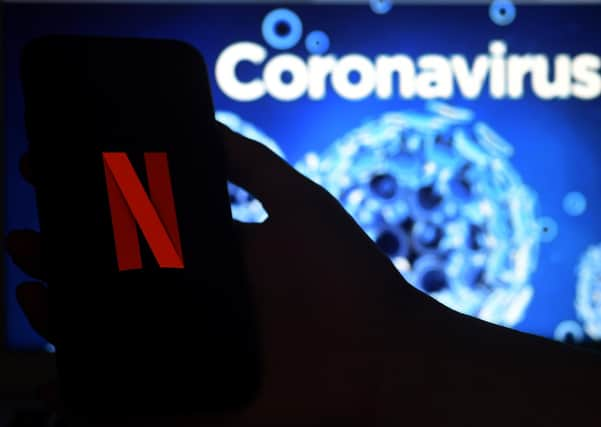The Social Dilemma takes aim at Facebook and Instagram - but Netflix is far from innocent: Anthony Clavane


Never mind The Haunting of Bly Manor. Or It Comes at Night. And you can forget about Into The Forest. If it’s nightmares you want, my friends, check out The Social Dilemma.
The problem was I didn’t want nightmares. I thought I had chosen to watch a cool-headed, investigative documentary about the dangers of social media.
Advertisement
Hide AdAdvertisement
Hide AdThe problem is that cool-headed, investigative documentaries don’t give you the jolts of adrenaline, higher anxiety levels and regular dopamine hits that are triggered by scary movies.
As one of the experts interviewed in The Social Dilemma put it: “How do you wake up from the matrix when you don’t know you’re in The Matrix?” A scary prospect indeed.
Well, by the end of the programme, I certainly knew I was in The Matrix. In fact, I was also in The Truman Show, 1984, several episodes of Black Mirror and any sci-fi horror film that delights in reimagining a virtual universe secretly implanting us with mindless habits and mannerisms.
“Get out of the system!” another expert yelled at us. “Yeah, delete! Get off the stupid stuff. The world’s beautiful. It’s great out there!”
Advertisement
Hide AdAdvertisement
Hide AdAs I actually agree with some of the arguments he was putting forward, I was initially tempted to turn off my notifications, delete my apps and tune in to the, er, beautiful world out there.
Social media, although starting out as a force for good, has definitely lost its way. It is wrong that Silicon Valley’s big beasts – Google, Facebook and Apple – are mega-powerful monopolies, misusing data, paying tiny amounts of tax and, by enabling the spread of fake news, contributing to the toxification of public discourse.
For example, it’s only in the last few days that Facebook has finally banned content that denies or distorts the Holocaust.
However, the counter-argument – that digital technology brings people together, reunites friends and families and acts as a lifeline (especially during a pandemic) – was never put.
Advertisement
Hide AdAdvertisement
Hide AdIt’s not only that the documentary was one-sided. What was really objectionable was the way, like a sci-fi-horror film, it tapped into our primal fears. In fact, it deployed the very same psychological techniques it accused the Big Tech baddies of using.
It argues that the powerful and wealthy corporate leaders who run the digital behemoths manipulate our social lives, exploit our vulnerabilities and control our emotions.
But by adopting such an over-the-top alarmist tone, seeking to over-dramatise the problem and present social media as some kind of evil, brain-sucking monster, director Jeff Orlowski ended up mirroring the worst excesses of the platforms he clearly despises.
Like the far right fake news organisations he rightly criticises for sewing chaos and division in society, his narrative hits all the anxiety triggers.
Advertisement
Hide AdAdvertisement
Hide AdHis use of eerie music was straight out of Hitchcock. And his dramatised narrative bits were clearly influenced by Black Mirror. The young lad who disappears down the rabbit hole of online conspiracy groups, manipulated by a sinister, Big Brother-esque, algorithm guy – played by Mad Men actor Vincent Kartheiser – could have been invented by Charlie Brooker.
The heroes of the story were the interviewees who used to be high-flying Silicon Valley executives and were now on a mission to expose the technologies they themselves had been involved in creating.
These former corporate leaders, who have reinvented themselves as conscientious objectors, were presented as sinners who had now repented. They had all seen the light, experiencing a kind of religious awakening.
As Elizabeth Pankova has written, in a brilliant piece in The New Republic: “Under the thin veneer of an informative and activist message, The Social Dilemma betrays a reliance on emotional intensity, shock, and entertainment value to attract its viewers.”
Advertisement
Hide AdAdvertisement
Hide AdNetflix, lest it be forgotten, is itself part of the world of commoditised entertainment the documentary critiques.
And it feels somewhat hypocritical for Orlowski to rail against the “addiction machines” of Facebook, Instagram and Snapchat when on The Social Dilemma website there is a clear exhortation to share the film on social media.
Support The Yorkshire Post and become a subscriber today.
Your subscription will help us to continue to bring quality news to the people of Yorkshire. In return, you’ll see fewer ads on site, get free access to our app and receive exclusive members-only offers.
So, please - if you can - pay for our work. Just £5 per month is the starting point. If you think that which we are trying to achieve is worth more, you can pay us what you think we are worth. By doing so, you will be investing in something that is becoming increasingly rare. Independent journalism that cares less about right and left and more about right and wrong. Journalism you can trust.
Thank you
James Mitchinson
Comment Guidelines
National World encourages reader discussion on our stories. User feedback, insights and back-and-forth exchanges add a rich layer of context to reporting. Please review our Community Guidelines before commenting.